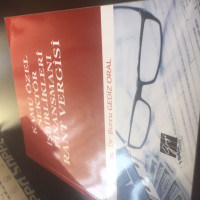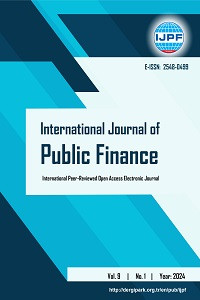Research Article
Issue Reviewers













Erdal Eroğlu is an Associate Professor in the Department of Public Finance at Çanakkale Onsekiz Mart University. He completed his undergraduate studies in Public Finance at Hacettepe University, Faculty of Economics and Administrative Sciences (2001–2007). He subsequently pursued graduate studies in Public Finance at Ankara University, Faculty of Political Science (2007–2009), and Bursa Uludağ University, Faculty of Economics and Administrative Sciences (2009–2010). He received his PhD in Public Finance from Bursa Uludağ University, Faculty of Economics and Administrative Sciences.
Eroğlu began his academic career in 2009 as a Research Assistant at Bursa Uludağ University and has been serving as a faculty member at Çanakkale Onsekiz Mart University since 2018. His academic work primarily focuses on budgeting and fiscal planning, local governments, governance, sustainable green economy and development, and green finance. In addition to numerous publications in these areas, he has served as a researcher and principal investigator in various research projects funded by the Scientific Research Projects Units of Bursa Uludağ University and Çanakkale Onsekiz Mart University, the Scientific and Technological Research Council of Turkey (TÜBİTAK; projects 1001, 3005, 1002, 2209), and the EU Erasmus+ programme. These projects mainly address themes such as active citizen participation, budget literacy, and sustainable green campus initiatives.
His current research agenda focuses on strengthening participatory mechanisms in local governments, promoting green public procurement, and advancing the green economy, with particular emphasis on integrating sustainability into public finance and governance practices.








Aim & Scope
The International Journal of Public Finance–IJPF aims to create a forum in which all kinds of research and information are shared in the bottom line of the science of public finance. There are articles based on original studies that deal with the economic, social, political, administrative, psychological, legal, and empirical aspects of the fiscal literature issues in the journal.
Starting with the first issue of 2016, IJPF appears twice a year (SUMMER and WINTER), which deals with all aspects of public finance science. IJPF is supported by the International Public Finance Conference/Turkey and is firmly committed to Open Access to disseminate research findings.
IJPF adheres to the Budapest Open Access Initiative definition of open access, according to which users have the right to read, download, copy, distribute, print, search, or link to the full texts of these articles. Users also have the right to crawl the texts for indexing, pass them as data to software, or use them for any other lawful purpose without financial, legal, or technical barriers other than those inseparable from gaining access to the internet itself. Creating derivative works is not covered by the BOAI and is thus subject to permission from the Global Justice Network.
IJPF adopts the ethical principles set out by the Committee on Publication Ethics-COPE regarding all components of the publication process; for publishers, editors, writers, referees, and readers. In addition, IJPF is an electronic and open-access journal published under a Creative Commons Attribution-NonCommercial 4.0 International (CC BY-NC) license. All articles published in the journal are given a DOI number.
International Journal of Public Finance - IJPF (E-ISSN: 2548-0499) is a peer-reviewed, open-access e-journal which publishes original research in public finance, with emphasis on topics about public finance theory, public economics, fiscal law, budget and fiscal planning.
Topics of the International Journal of Public Finance have been identified in the following main areas and subheadings. The issues are not limited to those listed, including all kinds of studies related to public finance.
1. THEORY OF PUBLIC FINANCE
Public Revenues
Tax Psychology
Tax Compliance
Financial Incentive System
R & D Expenditures
Local Administrations Finance
Taxpayer Behaviors
Tax and Foreign Direct Investments
Emerging Economies and Public Finance
Fiscal History
2. FISCAL LAW
Taxation Principles
Taxpayer Assignments
Taxpayer Rights
Taxation Process
Tax Offences and Crimes
Resolution of Tax Dispute
Tax Administration
Tax Audit
Tax Judge
Tax Incentive
International Taxation
Taxation of Contacts
Institutional Taxation
Transfer Pricing
Tax Smuggling
Rewriting Tax Procedures
E-Taxation System
Taxation of Finance Sector
3. FISCAL ECONOMICS
Fiscal Policy
Public Economics
Public Sector Balance
Economic Crisis and Public Policy
Economic Development and Taxation
Welfare Economics and Optimal Taxation
Welfare Economics and Economic Development
Welfare Economics and Income Distribution
Debt Burden and Economic Stabilization
Political Societies and Fiscal Capacity
Income Distribution and Public Policy
Market Failure and Fiscal Policy
Innovation and Public Policy
Public Sector Efficiency
Quality of Public Services
4. BUDGET AND FISCAL PLANNING
Public Budget
Budget Systems
Budget Principles
Budget Process
Budget Practices
Budget Control
Budget Right
Fiscal Planning
Participatory Budget
New Budgeting Approaches
Fiscal Transparency and Accountability
Treasury Transactions
Public Tender Transactions
Public Entrepreneurship and Privatization
Author Guidelines
For the articles sent to the journal to be evaluated, the following rules must be strictly followed:
General Rules
1. The journal accepted the following type of articles; research articles, review articles, letters to the editor, decision reviews, book reviews or bibliography (bibliometrics). These articles must not have been published elsewhere or sent for publication.
Article Types:
Research Article: It is a study that presents the methods, findings and interpretation of the results by conducting various field studies or experiments in order to put forward and prove an idea in the light of previous scientific studies. Research article; It consists of a title, abstract and keywords, introduction, material and method, findings, discussion, conclusion and references.
Review Article: It is a study that includes the synthesis, interpretation or evaluation of articles published in scientific journals by scanning them, bringing their results together, and collecting them with tables or graphics. The review article consists of the title, abstract and introduction, followed by the titles, conclusion and references that the author deems appropriate.
Letter to the Editor: It is a text written to draw attention to a subject or event that does not comply with the standard article rules of the journal and has scientific or practical benefits and to provide information. The letter to the editor should convey a clear message, be concise, and avoid excessive tables and references.
Decision Review: It is a study that systematically deals with an essential judicial decision, summarizes the event that is the subject of this decision, explains the solution style of the authorities, determines the issue of dispute, and presents a personal opinion by examining and evaluating the case.
Book Review: It describes, analyses, and evaluates a source. Since the focus of the book review activity is criticism, the review is a study that reveals the weaknesses and strengths of the work rather than a summary.
Bibliography (Bibliometrics): It is the analysis of publications produced in a particular field, in a certain period and in a certain region, and the relations between these publications by various statistical and mathematical methods. In other words, bibliometrics; is a study that includes statistical analysis of books, articles and other publications.
2. Articles should be written in English. Sentences must be in accordance with grammar and spelling rules. For spelling and punctuation rules in English articles, the Longman Dictionary of Contemporary English, Oxford Advanced Learner's Dictionary, and Cambridge Advanced Learner's Dictionary can be used (See http://www.ldoceonline.com/, https://www.oxfordlearnersdictionaries.com/, https://dictionary. cambridge.org).
3. Analyzing the articles uploaded by the authors to the system with the iThenticate similarity program, showing a maximum similarity rate of 20%. They are required to upload the analysis report and the signed author statements forms to the system.
4. The article file should not include information about the author(s). The article title and short title, author(s) name and surname, title, institution, ORCID number and e-mail address information, and author statements about research and publication should be included on a separate title page. The article's short title should be no more than 55 characters and 8 words. Authors who do not have an ORCID number should get their number from the https://orcid.org website.
5. In multi-author articles, one of the authors should be specified as the corresponding author, and the paper should be uploaded to the system by the corresponding author. The corresponding author does not have to be the first author.
Main Text Writing Rules
General Order: The manuscript should be written in Microsoft Word 2010 and higher format, with all-inclusive 5,000-9,000 words. The page layout is A4, and the margins for each side of the page (right-left, top-bottom) should be 3 cm. If the article is out of these limits to a certain extent, the journal editor decides to initiate the evaluation process.
Article Title: An article title should be suitable for the study subject. The article title should be a maximum of 15 words. The article's title should be written in bold letters with the first letters capitalized and centred on the page (Calibri font 16 pt).
Abstract: The abstract should be between 100-200 words, in Calibri font, with 10 points and single line spacing. In the abstract, information about the article's subject, purpose, method, finding and conclusion should be included. The abstract should be written in the past tense, should not be cited, and abbreviations should not be used.
Keywords: Below the abstract, 3-5 keywords should be included.
JEL Codes: 2-3 JEL Codes should be specified to quickly determine the article's field. JEL Codes are available at https://www.aeaweb.org/econlit/jelCodes.php?view=jel.
Introduction: The introduction should be between 150-250 words. The introduction should clearly state the study's importance, purpose, method, and scope.
Article Titles: Article main title and sub-headings 1., 1.1., 1.1.1. should be numbered starting from 'Introduction', including 'Conclusion' (excluding references), using decimal numbers such as only the first letter of all titles should be capitalized and written in bold.
Primary Text: The main text should be written using Calibri font, 12 points, 1.5 line spacing and justified. 6 pt spacing should be given after the paragraph. The first lines of the paragraphs should start within 1.25 cm. Suppose abbreviations are to be used in the text. In that case, the abbreviations should be shown in parentheses after the expansion when first used, for example, Organisation for Economic Co-operation and Development (OECD).
Tables and Figures: All tables, figures and graphics in the text should be numbered with their sequence number (Table 1, Figure 1). Titles of tables and figures should be written above the table and figure, centred on the page, in bold, and only the initials of the words should be capitalized. The source of tables and figures should be placed under the table or figure in accordance with the rules of the in-text reference. If the table or figures were created by the author(s), they should be specified below the table or figure. One line space should be left between tables and figures and the text.
Formulas and Statistics: Formulas and Equations should be written left aligned and numbered on the right side as (1), (2), (3) …. Symbols determined by APA should be used to express statistical values (For example, X̄ for the arithmetic mean, β for beta, α for alpha). Statistical abbreviations such as ANOVA, CFA, BIC, CFA, RMSEA, SEM, and SRMR should be explained where they are first used. 'zero' and 'dot' should be used for numbers below 1 if the statistical value can exceed 1: F(2, 15) = 0.43, t(20) = 0.52. If the statistical value cannot exceed 1, do not use 'zero' before the period: p=.015. For detailed information, see Chapter 6 of the 7th Edition APA Manual.
In-Text Citation Rules
• In-text citation (APA) method should be used in articles. The author's surname, year of publication, and page number should be indicated in parentheses in the citation (For example: Akdoğan, 2014: 135).
Example: Tools used in tax competition; tax rate reduction, general tax incentives and discounts can be specified as (Saraç, 2006: 125).
• The author's surname is used in the sentence, and it is sufficient to write only the publication date in parentheses after the name.
Example: As Nadaroğlu (2000) stated, taxation principles; "It refers to the issues to be considered in the selection, technique and application of taxes to realize the functions expected from the tax."
• When citing studies with two authors, the surnames of both authors should be written. The "&" sign should be used between the authors' surnames in parentheses (For example: Çetinkaya & Demirbaş, 2022: 38).
Example: Tax avoidance represents an inconsistent and irresponsible practice with a firm's obligations to society (Bird & Nozemack, 2018: 1010).
• When citing studies with three or more authors, the first author's surname and the "et al." phrase should be used (For example: Gerçek et al., 2021: 220).
Example: While describing the tax debtor and the person who must act materially, tax liability has content that includes material and formal duties (Senyüz et al., 2022: 92).
• Suppose more than one work of the author(s) published in the same year is cited. In that case, symbols such as "a, b, c" should be written at the end of the publication year to ensure that the sources are separated from each other (For example: Karakoç, 2021a: 82; Karakoç, 2021b: 257).
• If more than one study is cited at the end of the sentence, these sources should be included in parentheses, and a semicolon (;) should be placed between them (For example: Karakoç, 2021a: 148; Şenyüz et al., 2022: 257).
• Explanations on some issues intended to be explained in the text can be specified as footnotes under the page, and such footnotes should follow each other numerically (numerically). Footnotes should be written in Calibri 10 points, justified and single-spaced. However, references cannot be given as footnotes or endnotes.
Bibliography Writing Rules
• The author(s) should follow the American Psychological Association's (APA) 7th Edition Publication Guidelines when preparing the bibliography. See. American Psychological Association. (2020). Publication Manual of the American Psychological Association (7th ed.). https://doi.org/10.1037/0000165-000; American Psychological Association. (2021). Common Reference Examples Guide. https://apastyle.apa.org/instructional-aids/reference-examples.pdf.
• At the end of the article, a bibliography should be arranged alphabetically according to the authors' surnames. The bibliography should include all the references cited in the text. Page numbers should be specified for chapters in periodicals and compilation books.
• The same author(s) is cited, and the publication date should be started with the oldest. If more than one work of the author(s) with the same date is cited, references should be listed using the letters (a, b, …) after the publication date in the bibliography section and the text. In case of reference to a single author's work with more than one author, works with one author should be written first.
Examples of reference formats are shown below.
― Journals/Periodicals;
Feldstein, M. (2002). "The Transformation of Public Economics Research: 1970–2000". Journal of Public Economics. 86(3), 319-326.
Kirchler, E., Kogler, C. & Muehlbacher, S. (2014). "Cooperative Tax Compliance: From Deterrence to Deference". Current Directions in Psychological Science. 23(2), 87-92.
― Books;
Lang, M. (2013). Introduction to The Law of Double Taxation Conventions. Amsterdam: IBFD.
Acemoglu, D. & Robinson J. (2013). Why Nations Fail: The Origins of Power, Prosperity and Poverty. New York: Crown Business.
Brunnermeier, M. K., James, H. & Landau, J. P. (2016). The Euro and The Battle of Ideas, New Jersey: Princeton University.
Due, John F. (1971a). Indirect Taxation in Developing Economics. Baltimore: The John Hopkins Press.
Due, John F. (1971b). Government Finance: Economies of the Public Sector. Illinois: Richar D. Irwin Inc.
― Edited Books;
Baker, P. (2009). "Taxpayers' Charter and a Taxpayers' Charter for Europe". in Nykiel W. & Sek M. (Ed.), Protection of Taxpayer's Rights European, International and Domestic Tax Law Perspective (130-135). Warszawa: Wolters Kluwer Business.
― Thesis;
Salanauskaite, L. (2012). “Distributional Impacts of Public Policies”. PhD Thesis. Maastricht: Maastricht University.
― Reports;
Committee For The Study of Economic and Monetary Union (1989). Report on Economic and Monetary Union in the European Community. Madrid. http://aei.pitt.edu/, (02.10.2016).
European Commission (2015). Taxation Trends in the European Union, Data for the EU Member States: Iceland and Norway. Luxembourg.
― Papers;
Quliyeva, A. A. (2015). "The New Paradox of Modern Asymmetric Economy". 1st International Annual Meeting of Sosyoekonomi Society. 29-30 October 2015. Munich.
― Internet Sources;
International Monetary Fund (2016). Corruption: Costs and Mitigating Strategies. https://www.imf.org/external/pubs/ft/sdn/2016/sdn1605.pdf. (01.11.2016).
Ethical Principles and Publication Policy
ETHICAL PRINCIPLES
General Principles
The International Journal of Public Finance – IJPF is committed to adhering to its publication policy's academic principles and ethical values. IJPF accepts ethical principles published by the Committee on Publication Ethics (COPE), Directory of Open Access Journals (DOAJ), Budapest Open Access Initiative (BOAI), and CoHE "Scientific Research and Publication Ethics Regulation".
In the process of uploading, evaluating and publishing the manuscripts submitted to the IJPF system, the editors, the editorial board, the advisory board, and other officials must comply with the principles of confidentiality, transparency and impartiality.
Ethical Responsibilities of Publisher
Ethical Responsibilities of Editorial Board
Price Policy
The International Journal of Public Finance–IJPF does not charge a fee for the publication of articles and does not pay a fee to the author.
The journal does not charge article submission, article editorial processes, and/or evaluation fees.
Articles are published online and are freely available in accordance with the open access policy.
Indexes
Journal Boards
Editors

Adnan Gerçek is a Professor of Fiscal Law at Bursa Uludağ University (Türkiye), Faculty of Economics and Administrative Sciences. He is a member of the Turkish Tax Council and an editor of the International Journal of Public Finance. He received his Ph.D. in the public finance department at the Institute of Social Sciences, Bursa Uludağ University in 2001. His research focuses on tax law, tax system, tax administration, tax collection procedure, taxpayers’ rights, tax literacy, the discretionary power of tax administration, and the e-taxation system. Prof. Gerçek has authored numerous books, book chapters, articles, and reports.
Editorial Board




International Advisory Board





















________________________________________________________________________________________________________________________
Content on this site is licensed under a Creative Commons Attribution 4.0 International license.












